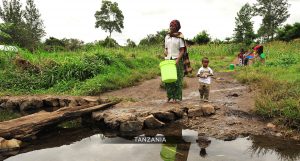Tanzania –Natural Resources: “ Communities must know their rights and obligations”- Report
In a recent workshop held in Dar es Salaam ( Tanzania), experts discussed the recent publication of the FAO Voluntary Guidelines on Responsible Governance Tenure. Feature.
By Deodatus Mfugale in Dar Es Salaam
“Inadequate and insecure tenure rights increase vulnerability, hunger and poverty and can lead to conflict and environmental degradation when competing users fight for the control of the resources,” an UN Food and Agriculture Organisation (FAO), published recently.
The eradication of hunger and poverty, and the sustainable use of the environment, depend to a great extent on how communities gain access to land, fisheries and forests which in turn is regulated by the exiting tenure systems. Tenure systems define and regulate how communities gain access to natural resources, whether through formal law or informal arrangements.
However tenure systems increasingly face stress as the world’s growing population requires food security, and as environmental degradation and climate change reduces the availability of land, fisheries and forests. This has sparked stiff competition for resources among the various users with marginalized communities getting a raw deal.
Many developing countries are endowed with abundant natural resources that could be used to improve the lives of their people and boost the economy of the respective countries. Countries with natural resources like forests, land, fisheries and wildlife could be treading with firm steps on the path to sustainable development but are struggling to feed their people most of whom live in abject poverty.
Governance failure in ensuring secure tenure and access to natural resources has denied Tanzanian rural communities from benefitting from existing sources of livelihoods. They have thus failed to attain food security and reduce poverty at family level.
How to understand the management of natural resources?
In a recent workshop held in Dar es Salaam to discuss the report, Dr Zacharia Ngeleja of Ardhi University said that the Guidelines contribute to achieving sustainable livelihoods, social stability, housing security, rural development, environmental protection and sustainable social and economic development.
While the Voluntary Guidelines merely present principles and internationally accepted standards for practices for the responsible governance of tenure, countries can develop their own strategies and other conditions that may ease the application of the Guidelines.
During the workshop participants underscored the need to educate communities on laws, policies, rules and procedures governing tenure of land, forests and fisheries so that they understand their rights and obligations.
“If they understand the issues then they can demand for tangible benefits from their responsibility to conserve natural resources and only then can Responsible Governance of Tenure come into play. It cannot work where communities are ignorant of laws, policies and rules governing their natural resources,” said one of the participants.
The case of Tanzania
For smooth implementation of the Guidelines, government must exercise transparency in its activities and enhance participation of communities in making decisions about the management of land, forests and fisheries which are major sources of livelihoods for many Tanzanians. There is also need for authorities to enforce laws, rules and regulations governing the management and administration of these resources in order to institute good governance.
“The Guidelines serve as an important base for responsible governance that observes justice fairness and human rights. But in order to have a smooth implementation, communities must know their rights and obligations to manage the resources, the treats to these rights and how to get redress when these rights are infringed,” said Prof. Lusugga Kironde of Ardhi University. “But there must also be political will in order to implement Responsible Governance of Tenure of these natural resources,” he added.
There are other obstacles to implementation of the Guidelines that must be dealt with. Some experts in the field of natural resources argue that current policies of land, fisheries and forests are outdated and need a thorough review and some changes in order to foster implementation of the Guidelines. The increased pressure on the resources, particularly land, has led to corruption and intimidation of marginalized communities most of whom are ignorant of their rights.
“Communities should be consulted on matters that affect their livelihoods because they eventually bear the brunt of bad governance that condemns them to hunger and poverty amid plenty of natural resources,” explained Dr. Felician Komu of Ardhi University.





